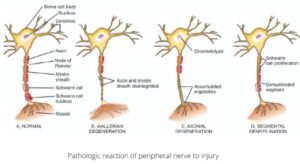Overview
Guillain-Barre syndrome (GBS) is an autoimmune and rapid (hour to weeks) but rare neurological disorder in which the body’s immune system mistakenly attacks part of its peripheral nervous system—the network of nerves present outside of the brain & spinal cord of the body.
Guillain-Barre syndrome (GBS) can range from a very mild clinical case with a severe weakness to nearly devastating paralysis, and leaving the person unable to breathe independently. Unfortunately, most people eventually recover from even the most severe cases of Guillain-Barre syndrome (GBS).
It is present with rapidly progressive, Ascending motor weakness that may lead to death from failure of respiratory muscles. Sensory nerve involvement is usually much less striking than is motor dysfunction. Sometimes, After recovery, some people will continue to have some degree of weakness present.
Guillain-Barré syndrome can affect anyone and any age people(although it is more frequent in adults and older people) and both sexes are equally prone to the disorder. According to research, Guillain-Barre syndrome (GBS) is estimated to affect about one person in 100,000 each year.
Causes

The exact cause of Guillain-Barre syndrome is unknown (idiopathic). But two-thirds of patients report various symptoms of an infection in the six weeks preceding.
These include systemic infection (e.g. campylobacter jejuni or Herpes virus) or Zika virus or other stress. (As a result of molecular mimicry).
There is no known cure for Guillain-Barre syndrome, but various other treatments can ease symptoms and reduce the duration of the illness.
Although most people chance to recover from Guillain-Barre syndrome, the mortality rate is around 4% to 7%.
On average 60-80% of people are able to walk at six months. Patients may experience lingering effects from it, such as weakness, numbness or fatigue, etc.
Symptoms
Guillain-Barre syndrome often begins with tingling, numbness, and weakness starting in your feet and legs and spreading to the upper part of the body and arms.
In around 10% of people with the disorder, symptoms begin in the arms or face. As Guillain-Barre syndrome progresses, different area muscles weakness can evolve into paralysis.
Various Signs and symptoms of Guillain-Barre syndrome are the following:
- Prickling, pins and needles sensations in fingers, toes, ankles or wrists and different sides of infection.
- Weakness in your legs and that spreads to the upper part of the body.
- Unsteady walking or climb stairs or inability to walk.
- Difficulty with facial movements, including speaking, chewing or swallowing, etc.
- Difficulty with eye muscles that leads to double vision or inability to move eyes
- Severe pain that may feel achy, shooting, or cramp-like and sometimes may be worse at night.
- Difficulty with bladder control or a bowel movement in the patient.
- Rapid heart rate.
- Low or high blood pressure.
- Difficulty breathing (affect the breathing muscles).
- Coordination problems and unsteadiness
Types of Guillain-Barre syndrome
Guillain-Barre syndrome is now known to occur in various types. The main types are the following:
- Acute inflammatory demyelinating polyradiculoneuropathy (AIDP):
- It is the most common form in Europe & North America in the world. The most common sign is Muscle weakness that starts in the lower part of the body( i.e. feet) and spreads upward.
- Miller Fisher syndrome (MFS):
- It is a paralysis that starts in the eyes and is also associated with an unsteady gait. It is less common in the United States but more common in Asia.
- “AMAN (Acute motor axonal neuropathy conditions) & AMSAN (acute motor-sensory axonal neuropathy)”:
- It is less common in the United State but these are more frequently seen in China, Japan, and Mexico.
Risk factors of Guillain-Barre syndrome
- Most commonly, infection with campylobacter, a type of bacteria often found in undercooked poultry products.
- Influenza virus
- Cytomegalovirus
- Epstein-Barr virus
- Zika virus
- Hepatitis A, B, C, and E
- HIV, the virus that causes AIDS
- Mycoplasma pneumonia
- Surgery
- Trauma
- Hodgkin’s lymphoma
- Rarely, influenza vaccinations or childhood vaccinations
Complications
Guillain-Barre syndrome affects your nerves. Following complications can be present
- Breathing difficulties: breathing muscle weakness.
- Heart and blood pressure problems: Blood pressure frequently fluctuates and irregular rhythms.
- Pain(severe nerve pain)
- Bowel & bladder function problems: sluggish (slow) bowel function and urine retention.
- Abnormal in blood clots
- Pressure sores (bed sores): due to immobile.
- Relapse: from about 2 % to 6 % of people with Guillain-Barre syndrome experience a relapse.
Severe, early symptoms of Guillain-Barre syndrome significantly increase the high risk of serious long-term complications. Sometimes, rarely, death may occur from such types of complications such as respiratory distress syndrome and heart attacks.